YEALD NEAWS
YEALD BUSINESS NEAWS UPDATE 2024 .1


YEALD BUSINESS NEAWS UPDATE 2024 .1


When you plant a seed in the substrate or soil, constant transformation begins. From seed to cutting, from cutting to young plant, from young plant to fruit or flower, and finally, from fruit and flower to transport, ending up in the consumer’s hands via retail. The entire horticultural process is one of continuous change.
This also applies to the whole horticultural sector. From crises to innovation, everything seems to be in constant flux. In five years, the horticultural sector will look different than it does today, and five years later, it will change again. Companies in this fascinating sector are also constantly transforming. Whether we’re talking about investments, mergers, or transfers, nothing ever stays the same. This makes entrepreneurship in the horticultural sector dynamic and challenging.
What will tomorrow’s horticulture look like? In this edition of YEALD NEAWS, we will take a look at the next generation of entrepreneurs—the growers shaping the companies and sectors of the future. How does the next generation view all the changes? Where are their roots, and where will their ambitions take them? Do all these transformations make these young entrepreneurs nervous or motivated? We visited Luc van der Knaap of Roots in Honselersdijk, Joyce Lansbergen of LG Flowers in Pijnacker, and Arian de Jong of Jong Fruit in Dongen to
The next generation steps into the future on their own terms.
Strategic location policy of Dutch Tulips Group.
ask them about their vision for their companies and their thoughts on future developments in horticulture.
Additionally, we will zoom in on three specific cases where YEALD has helped clients who were undergoing significant transformations to prepare for the future. For both Zijtwende International and WPK, we sought partners to ensure the continuity of the companies. In the third case, we visited Joost Wesselmans of the Dutch Tulips Group in Roelofarendsveen. His company’s growth required him to look for a new, future-proof location. Joost told us about the aspects he had to consider, how he made his final decision and what the challenges are in such a process.
Lastly, we will update you on the transformations happening at YEALD itself. In the ten years we have existed, not a single day has been the same. Enjoy this edition of YEALD NEAWS, which we hope will inspire you to make your business future-proof! <<
Zijtwende International and Harvest House are stronger together.
Looking back at 10 years of YEALD.
WPK and AgroCare/CombiVliet find common ground.
Introducing new YEALD employees.


A NEW GENERATION IS TAKING THE HELM AT MANY LEADING HORTICULTURAL COMPANIES. THE “NEXT GEN” IMPACTS BOTH THE SECTOR AND SOCIETY. HOW DID THEY ENTER THE BUSINESS, AND WHAT IS THEIR VISION FOR THE FUTURE OF THEIR COMPANY AND THE SECTOR? WE ASKED JOYCE LANSBERGEN (LG FLOWERS), LUC VAN DER KNAAP (ROOTS), AND ARIAN DE JONG (JONG FRUIT).

Joyce Lansbergen at LG Flowers
Joyce Lansbergen was 21 when she joined LG Flowers in 2009. The gerbera grower went through a difficult period, partly due to an investment in a fully automated system that took time to run efficiently.
“It is often the third generation that has a tough time in a family business; for us, it was the second generation,” says Joyce. “I was a top skater but chose a career in the family business where hard work was required. That was quite an adjustment.”“The company was a mix of BVs (private limited companies),” Joyce explains. “It was unnecessarily complex. I took a practical MBA to switch from being a top athlete to an executive, and I initially focused on untangling the structure. I learned the hard way. As a young, fresh graduate still learning the ropes of the trade, I transferred a huge amount of money to the wrong account. Yeah, what then? Well, you solve it and move on.”
Luc van der Knaap at Roots
Luc van der Knaap joined his father’s and uncle’s company straight out of school. “We had signed a contract with Looije through Growers United to also grow their honey tomatoes,” says Luc.
“Yeah, what then? Well, you solve it and move on.”
“That was a project I took on. It involved converting the greenhouse and managing staff. It’s fun to do something different from bulk and to specialize more. It was a good first year and a success. You get a flying start.”
Arian de Jong at Jong Fruit
Arian has been the owner of strawberry grower Jong Fruit for fifteen years. His father retired from the company and sold his shares to the then 21-year-old Arian and his brother, who was already an owner back then. “Last year, two things weighed heavily on my mind,” Arian notes. “My brother is much older and would eventually need to be bought out, and I had a lot of ambition to grow. So, should the money be spent on buying my brother out or to grow? That was my dilemma.”
“It’s not always easy to do business in this sector,” Arian continues. “In the past fifteen years, we’ve certainly made some wrong decisions. Sometimes, you don’t know what to do, but it usually works out if you stay calm and don’t try to solve everything all at once. We always say: Christmas time will roll around again, whatever happens.”
“It was a good first year and a success. You get a flying start.”
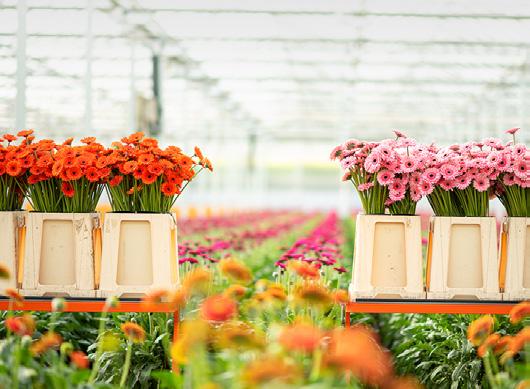

LG Flowers is a family business that grows gerberas in Pijnacker. The third generation, with brother Mike and sister Joyce, is now in charge. In 2024, the company will have been growing gerberas and germini for fifty years. LG Flowers is known for its high quality and out-of-the-box thinking.

Entrepreneurship within the current system
“Our sector’s system is outdated,” says Joyce. “Growers incur millions of euros to produce for a ‘casino’ where you have no idea what the financial yield will be in advance. And we accept that because it’s always been that way. In my opinion, it’s high time we changed that system.”
Luc also sees that the current system has reached its limits. “It used to be different,” says the young entrepreneur. “Innovation is important to optimize growth within the current system, but we also need to look at what system is optimal for the future. That doesn’t have to be the same system.”
“Innovation is important to optimize growth within the current system”
Scale-up and collaboration
Arian had also reached the end of his possibilities within the system at Jong Fruit. The solution came from Spain. “SurExport came our way; they were interested in our company. At first, I thought, what do we need a Spanish company for? But such a partnership offered a lot of potential. Moreover, it would solve both the buyout of my brother and my growth ambition in one go. Close collaboration with the right partner would ensure that we could withstand the sector’s fluctuations in the coming years.”
The solution for Roots was also a form of close collaboration. “In the past, an entrepreneur did everything themselves,” adds Luc. “From planting the cutlings to driving the truck to the auction. That’s no longer possible. Therefore, we started looking for a company to merge with and found a good partner in Prominent in Oussoren. Being a member of a cooperative like Prominent is a real advantage, in addition to joint purchasing, marketing, and meetings.”
New job positions in horticulture
At LG Flowers, they do things a bit differently. There, scale-up lies not so much in production but in overhead. “We have a larger payroll because we choose to hire dif-
ferent types of staff than other growers. We have created a layer of specialists around our traditional production staff. These specialists focus on breeding and production and on marketing our products. This makes us very crisis-resistant.”
“You shouldn’t want to do everything on your own,” confirms Luc. “You now delegate tasks to specialized employees. The scale-up through the merger between our two family businesses, which gave rise to Roots, also meant that, for example, HR is now a full-fledged executive position. This was also part of the strategy that led us to go for a merger.”

Roots is a tomato grower in Honselersdijk and Zevenhuizen. In Honselersdijk, eight small companies in the Broekpolder have been merged into one 14.6-hectare plot of land. In Zevenhuizen, there are 11.2 hectares of glass. Roots arose from a merger between the Van der Knaap and Oussoren families. The company is part of Prominent and Growers United.

The last few years have shown that nothing is predictable any more in the horticultural sector. Times have been volatile, from Corona to the energy crisis, from the disappearance of synthetic crop protection to the war in Ukraine.
Never waste a good crisis
“I can generally appreciate a crisis in horticulture,” says Joyce resolutely. “Because it instigates action to move forward. We all see that the system needs to change, but a crisis makes us move and forces us to think differently about our business, market, and sector. I see this as a great opportunity.”
“Some things you just have to dare to do; it’s not always about the money. By trial and error, you continue to learn as an entrepreneur and see what works and what doesn’t. It’s a matter of seeing and seizing opportunities, but also of having courage and of continuing to develop in order to create new opportunities.” At Jong Fruit, they also see the impact of crises. “During the energy crisis, we left one company empty for a whole season,” says Arian. “That had a big impact; we lost our blueprint. At the end of the day, though, you choose the option that will result in the smallest loss, and now we have built a CHP unit at that company.”
The power of a collective approach
“You think more about your processes during a crisis,” Arian continues. “We are now working on more resistant varieties and looking for processes that provide greater stability. Thanks to the support of SurExport, we remain more in control of production while they have gained access to the Dutch retail market. We are now among the top strawberry growers in the Netherlands through the choices we have made in recent years, and the future looks bright.” Roots has also opted for the power of a collective approach to tackle future crises. “We are members of Prominent and Growers United, which provides security. As a group, we discuss how best to deal with a crisis,” says Luc. “I am also in a U40 Future Proof group with young entrepreneurs where we meet up to discuss strategy and whatever other topics come our way.”
New times, new entrepreneurs
“Times are changing,” says Luc. “Staff is different, as is the use of data. That requires a completely different strategy.
It’s also important to keep up with things like innovation, sustainability, and CSR. Therefore, we are also working on innovating our systems, as we mentioned earlier. We are now also looking at crops and greenhouses that would be ideal for autonomous cultivation with robots instead of adapting robots to our current greenhouses and crops.”
Joyce wants LG Flowers to not only be about money. “I’d rather that we work in shifts than buy an expensive machine, and basic sustainability issues should be the norm for us rather than a burden. In our sector, it’s all about the prices, about more and more and more. Maybe we could achieve a lot more if we all adopted the ‘less is more’ principle.”
“We love entrepreneurship,” she says. “The product is of secondary importance; now it’s gerberas because of our history, but you can do great things with these greenhouses. I have no idea what we’ll do in a few years, maybe the same, maybe something completely different. That’s what makes entrepreneurship so much fun. We’re not done playing yet.” <<


Jong Fruit is a large strawberry grower in Dongen. They grow three million kilos of strawberries per year on 23 hectares, of which 3 hectares are lit. This places them among the top strawberry growers in the Netherlands. On January 1, 2024, the company entered into a partnership with SurExport from Spain.

How do you make a company future-proof? Zijtwende International had to find the answer to this question to ensure business continuity for the coming years. It is a complex question with many facets, and the answer varies per company. How did Zijtwende approach it?
Jan Prins is now in his mid-sixties. Ruud Barendse and Cor Keijzer have taken care of the succession issue. But succession wasn’t the only thing that management had to look into. Future-proofing also means keeping up with the times regarding organization, processes, and relationships.
Trade, retail, and grower
The world has changed. Where Zijtwende initially had a

high transaction rate, this has shifted over the years to programming and strategic purchasing partners for retail. Trade has become more transparent, and both the growers and retailers have more insight into the market, with the latter taking a dominant position.
What does retail want?
Retailers want to do business directly with the source and not buy through too many different channels, especially

if these channels come from the same grower. Zijtwende had a good relationship with a large number of retailers. Becoming future-proof meant the trading company needed to get closer to the grower.
Company culture
How? By partnering with a party already close to the growers. There were several parties who were interested, including private equity firms. YEALD was commissioned by Zijtwende to help with selection. What were their needs, what type of company fit their culture, and what was the right timing? A match was finally found with Harvest House. By becoming part of Harvest House, Zijtwende has come closer to the grower. This positions Zijtwende as the link between retail – a world they know well – and growers. At the same time, the cooperative can take over administrative tasks, allowing Zijtwende’s people to focus entirely on entrepreneurship.
Trust each other
The collaboration between Harvest House and Zijtwende is based on: Do what you are good at and trust each other. This applied to us at YEALD as well: Once the letter of intent had been signed, YEALD ensured a smooth transaction for Zijtwende, including taking care of due diligence and all official documents and filtering all questions that Zijtwende had to deal with; all on the basis of doing what you are good at and mutual trust. And that is the answer to the question: How do you make a company future-proof, specifically in the case of
Do what you are good at and trust each other. That is the basis of the collaboration between Harvest House and Zijtwende.
Zijtwende. By partnering with Harvest House, Zijtwende can now focus more on its core activity as a strategic retail purchasing partner. <<


Zijtwende was founded in 2005 when Jan Prins left The Greenery. He built Zijtwende into a big name in vegetable trading with John Harting of Harting Holland. The company focuses mainly on greenhouse vegetables, in particular tomatoes.

How do you ensure continuity for your company across generations? Previously, horticultural companies were often passed down to one of the children. Those days are basically gone. Due to scale-up and a more complex market, entrepreneurship is becoming an increasingly significant challenge. More than one person is often needed to replace the DGA (Managing Director). Financing the takeover of the company by a successor within the family is also becoming increasingly difficult. At WPK, they found a solution.
Finding the right partner
How do we ensure WPK’s continuity? That was the question Erik and Eviek van der Arend asked themselves.

“Together with YEALD, strategic sessions were held to explore the options.”
Together with YEALD, strategic sessions were held to explore the options. The final conclusion was that there were many opportunities, but it seemed wiser not to tackle these alone. We needed to find a partner. But who do you choose?
First, we prepared an information memorandum (IM) together. An IM covers various topics, including the company, its market, and the opportunities the company can offer to the right partner.
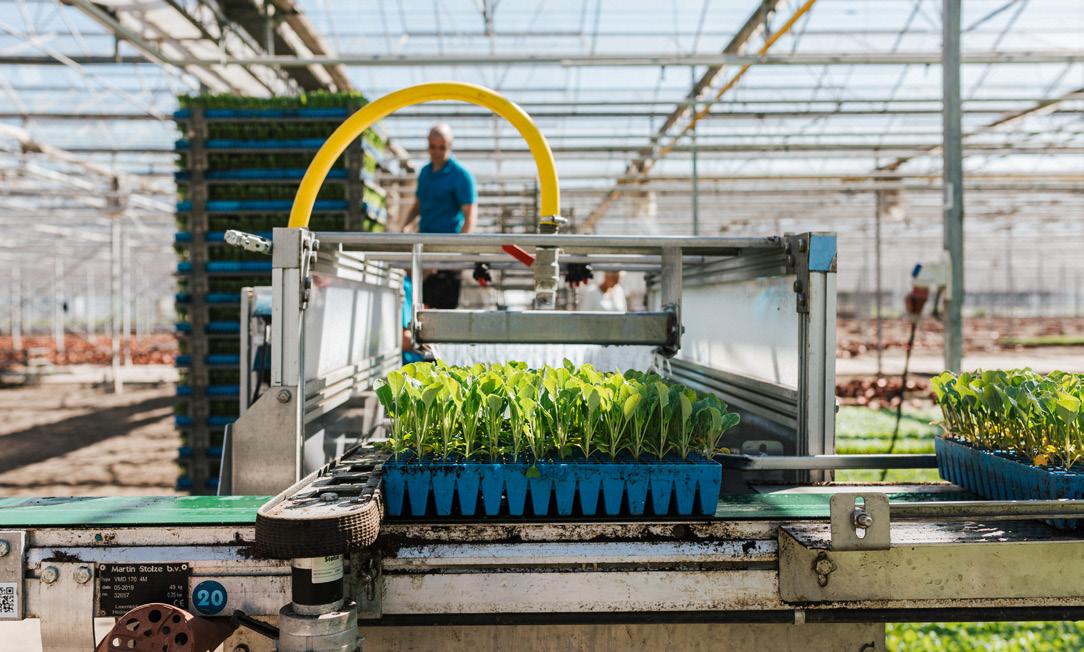
Next, a long list was drawn up based on the criteria for a partner. The top five potential candidates emerged by comparing the long list and the criteria. Each candidate’s potential was assessed using teasers and an NDA (non-disclosure agreement). YEALD’s expertise and network served as a test. It was encouraging to see interest from both the sector and private equity. In the end, the combination of AgroCare and CombiVliet emerged as the best possible partners. The interest was certainly mutual.
By selling a majority stake, Erik and Eviek were able to monetize part of their assets while ensuring the company’s continuity. AgroCare and CombiVliet fit well with WPK’s culture; CombiVliet had been WPK’s customer for years. This transaction has strengthened CombiVliet’s grip on supply. Additionally, the buyers aim to let their investments operate as independently as possible. There is a strategic interest, not necessarily an operational one. YEALD knows many companies who are looking to buy or sell in the horticultural sector and private equity. Our expertise was extremely valuable in this matchmaking process. The parties involved know the market and each other well. It’s great to see that we can help such companies find each other in terms of strategy and business culture. Once the match has been made, we assist with the proper transaction handling. Thus, all companies involved are made more future-proof. <<
It was encouraging to see interest from both the sector and private equity.

Family business WPK has led vegetable plant propagation for decades. This includes warm plants like tomatoes, peppers, and cucumbers and cold plants like cabbages. WPK produces ornamental plants outside the season under its own brand, House & Garden.
Under the leadership of Erik and Eviek van der Arend, fifty permanent employees work at two locations in ‘s-Gravenzande and Made. There is also a flexible layer of greenhouses to accommodate seasonal peaks.

How do you determine which location is suitable for your company’s growth? That was the question Joost Wesselman was asking himself when he outgrew his current location in Roelofarendsveen with Dutch Tulips Group. “We are a real Veens company with local employees,” he says firmly. “So, the main requirement was that we remain a Veens company. But that was quite complicated.”
Who are we talking about? Dutch Tulips Group specializes in tulip bulb cultivation and in the forcing and selling of tulips. In recent years, they have grown into one of the largest players in the entire chain. One of the ways they did this was with the help of Tulpen.nl, a sales organization with a market share of around 15% and the involvement of several franchise growers. Wesselman Flowers also produces its own tulips, which are also sold via Tulpen.nl. Both companies have experienced tremendous growth in recent years.

“There will soon be a high-end tulip-forcing facility with everything we need for our role in the chain”
The right place for a high-end tulip-forcing facility
Growth meant moving to a new location. Joost soon had a specific location in Nieuwveen in mind. Due to the long-standing relationship between Joost and Arthur Vijverberg, YEALD’s expertise was brought in. “Calculations were made for the Nieuwveen location, but it didn’t look promising. It was too remote and had too many logistical challenges. I had trouble letting go of the idea, but I knew that location wouldn’t work.”
During the same period, Joost started talking to a rose grower who mentioned wanting to sell his company.
“YEALD mapped out the possibilities that this location could offer us,” Joost continues. “I was easily convinced. It took some negotiation, and the renovation will not be easy, but there will soon be a high-end tulip-forcing facility with everything we need for our role in the chain.”
Deliberate strategy
What has become clear in recent years is that the Dutch Tulips Group is gaining more control over the entire chain with its companies. “Yes, that is a deliberate strategy,” says Joost. “We grow fifty percent of the bulbs we use in production, and we produce fifty percent of the tulips we trade via Tulpen.nl. This ensures stability but also provides us with a variable that we can adjust.”
This strategy requires growth, and growth requires personnel who share this vision. “Our rapid growth created a need for vision and job security for our employees. We created a vision document and submitted it to internal
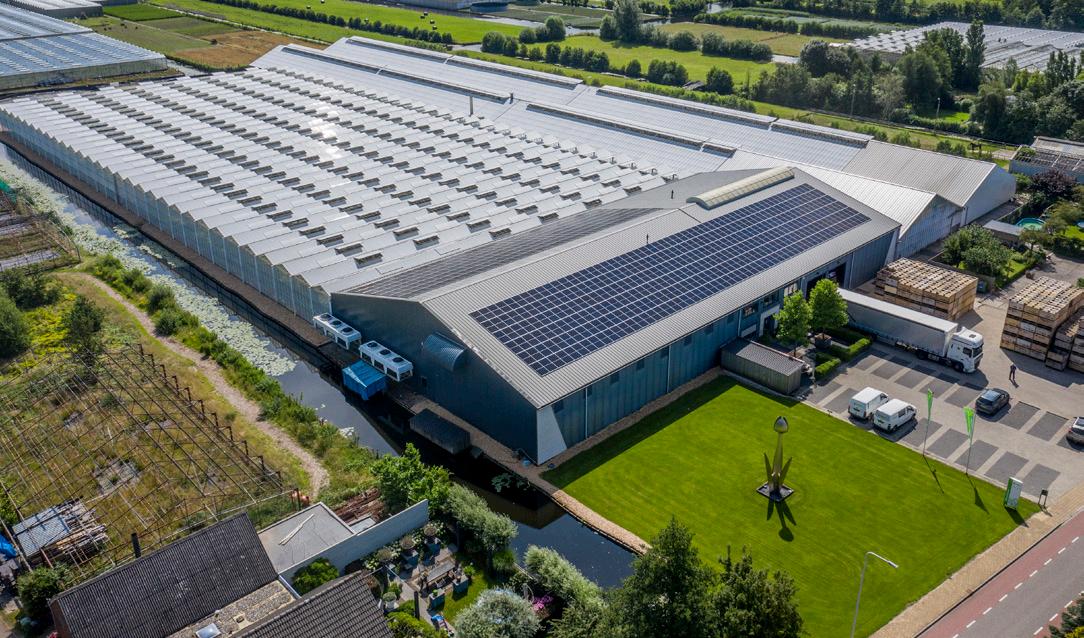
and external advisors. It’s important to involve your employees in guiding your company and to give them responsibility.”
This vision resulted in the construction of a hypermodern facility at a desirable and profitable location. However, the journey was not straightforward after the purchase agreement was signed and construction plans were approved.
“An entrepreneur wants to avoid extreme risks,” Joost adds. “That also applies to complex projects like our investment in a new location. It was very helpful to brainstorm with an expert party when we were searching for a suitable location that would meet our requirements. The entire purchasing process was also easier to do with people who had done this before.”
If you don’t keep up with the times, you fall behind and disappear. Innovation is not a “nice to have” but a “need to have”. This certainly applies to the construction of a new site, where the investment requires the company to remain profitable for a long time. “In the past, innovations were an interesting way to optimize processes,” says Joost Wesselman. “Nowadays, innovations are essential to tackle societal challenges like sustainability and labor. You need to consider that when making significant investments.”
And how does Joost look back on his company’s journey so far? “You need to discover what you want and what you enjoy doing as an entrepreneur,” he says. “Then gather the right people around you, such as advisors and employees. You need to trust them and give them the responsibility to take over tasks. Then the sky is the limit.” <<
“Nowadays, innovations are essential to tackle societal challenges like sustainability and labor.”

Dutch Tulips Group comprises a number of companies that emerged from the family business Wesselman Tulpen. It is a mixture of companies run by Joost Wesselman. In addition to tulip bulb and tulip production, the company also has a packaging branch and a large sales channel with Tulpen.nl.
10 YEARS OF YEALD

YEALD was founded in 2014, which means that we have been around for ten years this year. “The goal we had in mind for 2014 is where we are now,” says founder Rob van Leeuwen. “And 2014 to 2024 have been ten incredibly beautiful years.”

Rob was once a grower, something he did with great pleasure for seven years. “When the horticultural company was sold, I started working at Vollebregt Barten in real estate,” says Rob. “I learned a lot there. But I saw that in the future, horticulture would not only be about real estate but much more about strategy, organization, cash flows, further professionalization, and the involvement of private equity.”
Professionalization and scale-up
“In 2012, you were often looked at strangely if you talked about cash flows or EBITDA,” Rob says with a laugh.
“But YEALD’s philosophy is much broader. We want to advise all these wonderful companies in our sector on professionalization and scale-up. And I mean breeders, propagators, growers, and suppliers.”
New kid on the block
Rob started YEALD with this philosophy, and two years later, Robin Berendse and Arthur Vijverberg joined the team as partners. Roger Gerritzen joined as a partner five years ago. “We mainly learned that you can’t do everything all at once; some things take time. Especially in the early years as a ‘new kid on the block,’ we had to work hard to prove that we were worth trusting.”
YEALD has completed many wonderful projects. “Yes, I think of many great real estate transactions, mergers, and bringing private equity together with amazing companies in the sector and of all the M&A projects that have been

“We have seen satisfying growth in terms of projects, their scopes, and our team.”
realized. We are particularly proud of the fact that these projects have all been successful. We don’t want to mention specific projects because there will then be relationships that we haven’t mentioned and that wouldn’t be doing them justice. We have seen satisfying growth in terms of projects, their scopes, and our team. Yes, when we look at YEALD now, we see a great company.”
“And in ten years, we will be even further,” Rob continues. “We want to serve the entire horticultural business and elevate the sector together with the companies involved; in the Netherlands but also internationally. We don’t want to shout from the sidelines but be co-entrepreneurs with the parties joining us. That’s how our relations know us. And we’ll continue to do this until we are the chosen number one in the sector in all facets of what we do with our team.” <<
Young talents strengthen our team at YEALD. We would like to introduce them to you.
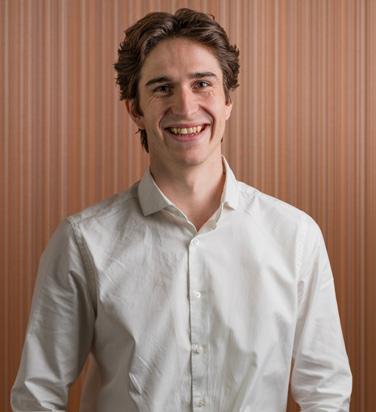
Arthur is our new analysis assistant. In addition to his responsibilities at YEALD, he is studying International Business Administration at the Rotterdam School of Management (RSM), where he is expected to graduate in 2025.
Before moving to the Netherlands for his studies, Arthur grew up in the French Alps. He is driven by his passion for innovation and aims to improve food ecosystems to address the global challenges of a growing population and a changing climate. <<
“Passion and commitment are the foundations of every great achievement”
Nikki is our Office Manager, responsible for coordinating and optimizing daily office operations. Besides, she manages the bookkeeping and prepares financial reports. Nikki’s critical view ensures efficiency and accuracy in every aspect of her work.
She has a keen attention to detail and is constantly seeking ways to improve processes. Her friendly and approachable personality makes her an invaluable member of the team. <<
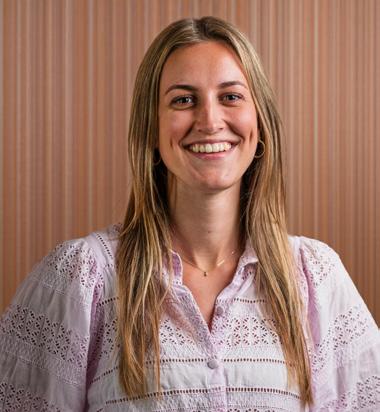
Boswoning 4a 2675 DZ Honselersdijk +31 174 75 25 00 www.yeald.nl

Rob van Leeuwen +31 6 51 62 41 08 rl@yeald.nl
Robin Berendse +31 6 24 20 10 10 rb@yeald.nl
Arthur Vijverberg +31 6 40 55 04 61 av@yeald.nl
Roger Gerritzen +31 6 12 52 38 18 rg@yeald.nl